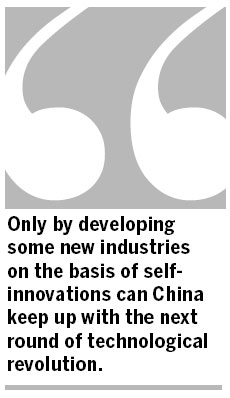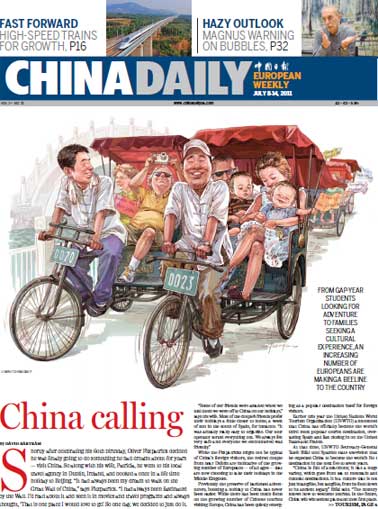Op-Ed Contributors
Coping with global inflation
Updated: 2011-07-14 09:23
By Zheng Xinli (China Daily)
US dollar devaluations mean China should improve its innovation and transform its economic development mode
The global financial crisis that erupted three years ago and has taken its toll on the global economy is in essence a crisis of the US dollar as the world's leading reserve currency.
World economic adjustments in the post-crisis period are expected to further unfold in the fierce struggles among relevant countries involving the dollar's status as the world's reserve currency, which will have enormous impacts on the external environment of China's economic development during the 12th Five-Year Plan period (2011-2015).
As part of world's ongoing economic adjustments, global inflation triggered by the depreciation of the dollar will continue into the future, which will increase imported inflationary pressures on China, threaten the country's foreign reserve security and constitute an immediate, and indeed, the biggest challenge to its development over the next five years.
The quantitative easing policy adopted by the US Federal Reserve, aimed at shifting the US' economic losses to other countries, has fuelled sharp devaluations of the dollar and global inflation. Given that 70 percent of China's foreign reserves are dollar-denominated assets, every 1 percent depreciation of the dollar will lead to more than $10 billion of its foreign reserves evaporating.

Also, the drastic price rises of bulk commodities such as oil, iron ore, beans and cotton in recent years, as a result of the US' adoption of the weak dollar policy, have brought huge pressures to China's manufacturers that are heavily dependent on imports of these commodities. China has achieved success in fending off the first impacts of the global financial crisis, but it has yet to come up with effective measures to better resist the new wave of global inflation in a bid to maintain the safety of its financial assets.
The crisis has seriously weakened import demands in developed countries, thus adding difficulties to China's export-driven economy. As China's main export markets, the US, the European Union and Japan - which are all in a serious debt crisis - are struggling to recover from a lingering economic slowdown. This means that China is facing gloomy external demand and has yet to open new export markets for the sustainable development of its economy.
The US is trying to extricate itself from the global financial crisis with new technological breakthroughs, such as Washington's new energy strategy and its new-generation Internet technology, but this will result in huge competition pressures for China. Only by developing some new industries on the basis of self-innovations can China keep up with the next round of technological revolution.
In this context, China should strive to transform its established economic development mode and push for economic restructuring to realize steady and comparatively rapid economic development over the next five years.
To this end, it should first promote its economic transformation from investment and export-driven to consumption-driven and try to give resident consumption a bigger role in driving national economic growth.
China's current high investment ratio, which was 47 percent in 2009, and its low consumption ratio, 35 percent in 2009, are the result of its long-term emphasis on investment and lack of attention to consumption, and are unsustainable. The government has vowed to adjust the structure of national income distribution, increase the incomes of middle- and low-income groups and raise the ratio of resident consumption, but no substantial progress has been achieved so far.
The country should try to achieve an essential breakthrough in this regard during the 12th Five-Year Plan period, such as taking more concrete and effective measures to expand employment, reform the current taxation system, promote urban and rural integration and expand public consumption.
In terms of industrial structural adjustment, China should change its economic growth and try to promote coordinated development among its first, second and tertiary industries, especially by boosting the development of the tertiary sector. The sluggishness in the development of the service sector has not only seriously hindered the expansion of domestic employment and consumption, it has also become a major obstacle to the further development of the first and second industries.
The main reason for the slow development of the service industry is the high business tax on this sector. The lack of a well-developed financial network to offer credit to small- and middle-sized enterprises has also hampered its development, especially small-scale operators. Therefore, the country should try to develop financial, information and logistics industries and introduce a series of preferential policies for the tertiary sector to boost its development.
China should turn to technological progress and improvements in management expertise and labor quality rather than extensive consumption of materials to prompt its economic growth. To facilitate this process, the country should try to improve its self-innovation capability, especially with regard to the Internet, new energy, energy conservation and emission reductions and biological technology, as well as manufacturing and electric cars.
At the same time, more concrete steps should be taken to narrow the gap between urban and rural areas in a bid to build a urban-rural integrated system, promote agricultural modernization and accelerate the construction of the socialist new countryside.
The author is a member of the National Committee of the Chinese People's Political Consultative Conference and deputy director of the Subcommittee of Economy of the advisory body.
China Forum
E-paper

Burning desire
Tradition overrides public safety as fireworks make an explosive comeback
Melody of life
Demystifying Tibet
Bubble worries
Specials

90th anniversary of the CPC
The Party has been leading the country and people to prosperity.

Say hello to hi panda
An unusual panda is the rising star in Europe's fashion circles

My China story
Foreign readers are invited to share your China stories.
